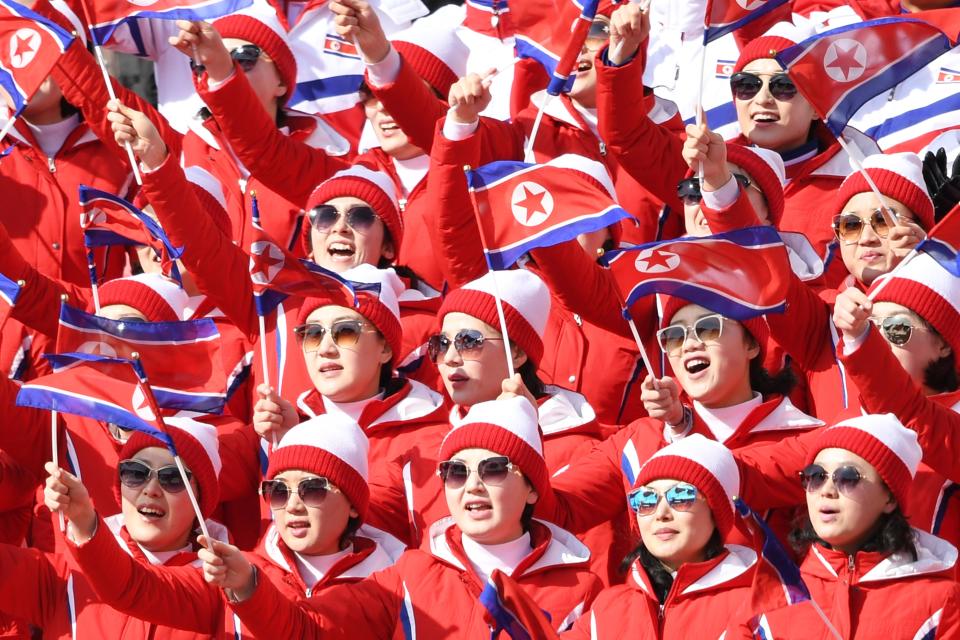North Korean Olympians have been terrible; how will Kim Jong Un fix that?
Kim Jong Un apparently dreams of turning North Korea into a sporting power. If so, and if the 2018 Winter Olympics are any indication, he has a long way to go.
The PyeongChang Games have likely been a rude awakening for any North Korean duped into believing in his or her country’s athletic prowess. Nine North Korean athletes, plus members of the unified Korean women’s hockey team, have competed thus far. The hockey team’s results typified their collective struggle: An 8-0 loss to Switzerland. An 8-0 loss to Sweden. A 4-1 loss to Japan. Another defeat to the Swiss, this time 2-0.
The individuals haven’t fared any better. Speed skater Choe Un Song finished with the worst time in his 1,500-meter heat. Cross-country skier Ri Yong Gum finished 89th out of 90 in the women’s 10-kilometer race; Han Chun Gyong and Pak Il Chol finished 101st and 107th out of 116 in their 15K.
Figure skating pair Ryom Tae Ok and Kim Ju Sik, the only two of 22 total North Korean athletes to have qualified for the Games on merit, finished 13th out of 16 in their event.
On the alpine slopes, Kim Ryong-Hyan was 54th out of 54 finishers in the women’s slalom; Kang Song Il and Choe Myong Gwang were 74th and 75th out of 75 finishers in the men’s giant slalom.
North Korea, in a political sense, has already won the Olympics. With the help of the IOC, it manufactured tons of propaganda out of an event to which it had no invitation two months ago. It is, in reality, a brutal, repressive dictatorship. It has, in PyeongChang, gone on a “charm offensive.”
Kim Jong Un probably understands, though, that there is even more potent propaganda to be had on fields, in stadiums and on tracks – especially for an isolated nation that rarely exposes itself to the world. Sporting success sends messages of nationalistic superiority. It elevates a country’s international status.

That success is currently almost non-existent. North Korea sends athletes to the Olympics, because sending athletes is the only legitimate first step toward competitive success. But right now, their failures reportedly aren’t broadcast to sheltered citizens back home. That would contradict the regime’s message of self-supremacy.
After all, it can’t risk a repeat of 2010. Sports are rarely televised live in North Korea. But after the national soccer team played valiantly in a 2-1 loss to Brazil in its World Cup opener, officials reportedly decided to make the team’s second match, against Cristiano Ronaldo and Portugal, available in real time. It ended 7-0. North Korean players were reportedly publicly shamed and reprimanded for six hours upon their return to Pyeongyang. (Some reports suggest their World Cup predecessors, members of the 1966 team, were sent to labor camps after a quarterfinal loss.) Their crime? Embarrassment and “betrayal.”
The only sure-fire way to avoid the embarrassment, of course, is to stem it at source; to win. That’s why Kim Jong Un, in 2015, released a plan entitled, “Let Us Usher in a New Golden Age of Building a Sports Power in the Revolutionary Spirit of Paektu.” Unnecessarily verbose title aside, the intent was clear.
But how? How can a country shut off from the outside world, coping with economic sanctions, and ravaged by extreme poverty engineer sporting success?
Per an Associated Press article on the subject, “The North Korean leader is pouring resources into training and infrastructure, athletes are getting more recognition than ever and the country now even has an all-sports television channel, though it’s not clear how many citizens are able to actually watch it.”
That sounds like a start. A fascinating Bleacher Report feature in December detailed the North’s plan for soccer development. It is known to have built a massive ski resort that serves as an elite training center. Its secrecy leaves open the possibility that its investments in sports go far beyond what is public knowledge as well.
That secretive nature is what leads to the cynicism, too. The AP article mentions East Germany. East Germany, of course, infamously doped its way to astounding Olympic success, despite a population less than one-tenth the size of the U.S. at the time.
Though Kim Jong Un has never publicly made the comparison, many are skeptical that North Korea could follow all bullet points of the East German blueprint. And the skepticism isn’t completely unfounded. Several high-profile North Korean athletes have been punished for doping in recent years, with the impressive women’s soccer team banned from the 2015 World Cup after five players tested positive for steroids in 2011.
It is much harder to evade doping regulations in 2018 than it was in the 1980s. But that doesn’t mean North Korea won’t explore all potential avenues to athletic prosperity, no matter how extreme or illegal. The problem – or, depending on your point of view, the enabling advantage – is that there’s no way for any outsiders to know exactly what they’re exploring.
—
More from Yahoo Sports:
• Shiffrin’s boyfriend booted from Olympics for angry post-race comments
• Wetzel: Russian curler accused of doping could end Putin’s Olympic pep rally
• Bad American skier games system to compete in PyeongChang
• Why isn’t Sweden playing likely No. 1 NHL draft pick?
• Wetzel: Shibutanis keep Olympic ice dancing all in the family



